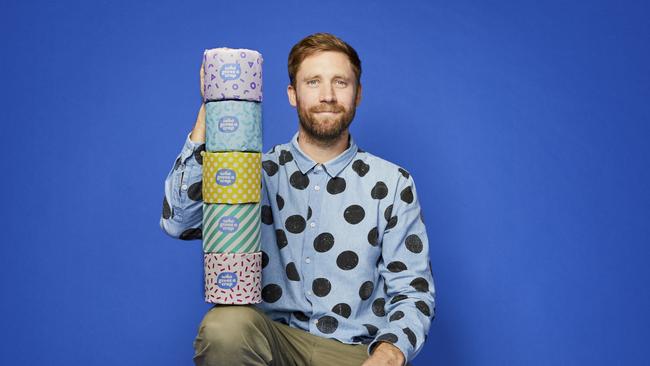Inside Who Gives a Crap’s ‘big hairy’ goal to rival Kimberly-Clark to help solve global sanitation crisis
The irreverent toilet paper brand has capped off its second-biggest donation since the pandemic as it seeks to ensure everyone in the world has a toilet. But it’s only scratching the surface.

Who Gives a Crap – the irreverent start-up that counts Mike Cannon-Brookes among its investors – has capped off its second biggest donation as part of its efforts to help solve the sanitation crisis, plaguing developing countries.
The toilet paper brand has donated around $4.7m – which is split between direct giving and tech firms working on sanitation and hygiene solutions. This is second to $5.85m Who Give a Crap donated in 2020 during the height of toilet paper and other pandemic-fuelled grocery shortages that sparked panic buying across supermarkets.
Co-founder and chief executive Simon Griffiths said this year’s donation showed that the pandemic was not a sugar hit and the company was progressing with its plans to eventually rival US Kimberly-Clark – which generated $US20.43bn annual revenue last year. Who Gives a Crap doesn’t disclose its earnings but donates 50 per cent of its profits and says it needs to be the size of Kimberly-Clark to make a “significant impact” on global sanitation.
“We call that the big hairy audacious goal or the 30-year goal. We’re very much on an S-curve, and we’re kind of at the bottom of that S-curve. But we said we want to do it by 2050, and so we’ve still got 26 years,” Mr Griffiths said.
He said this year’s donation helped support 845,000 people worldwide. Projects funded included installing toilets in Nairobi’s urban slum, which involves containerised waste collections. Waste is taken away for off site processing, mixed with restaurant waste and can be treated to become fertiliser or chicken feed.
“And then we do some more tried and tested blue chip stuff. We sort of think about where we invest, like a share portfolio, where you want to have some exposure to the kind of high risk, high return technology sector, for want of a better analogy.
“We give what’s called unrestricted funding, which means that the you know we’re saying you’re the smartest guys in the room, you know how to allocate this capital better than we do to create impact, and we trust you based on your track record.”
Mr Griffiths said most of these projects had an “engineering lens” such as drilling boreholes and mapping water points.
“It’s kind of like a VC fund,” he said.
“By increasing people’s access to toilets and providing them with clean water, we are doing much more than just saving lives but helping girls go to school, fight systemic injustice and protect the planet.
“There is a lot more work to be done, but through this donation, we’re even closer to our goal of giving everyone access to clean water and toilet.”




To join the conversation, please log in. Don't have an account? Register
Join the conversation, you are commenting as Logout